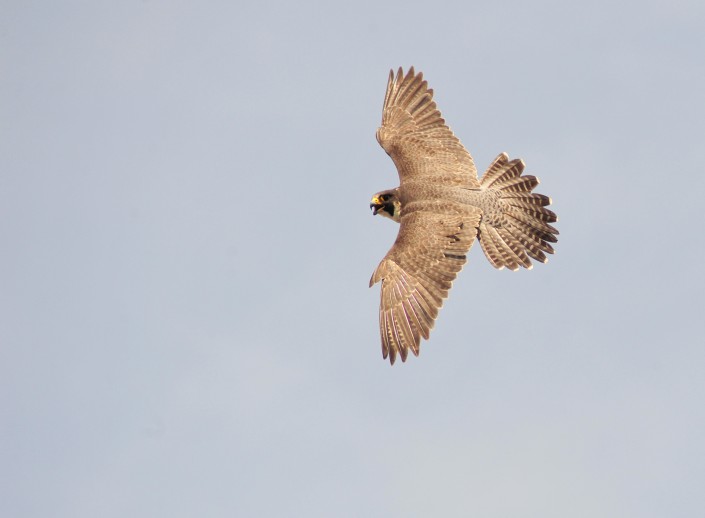Jersey City’s Peregrine Falcons
Meet the nesting pair!
by Ben Wurst, Habitat Program Manager
Peregrine falcons are the largest falcon in New Jersey. They are found world-wide and are the fastest bird. They were once extirpated from the state (and all areas east of the Mississippi River) by 1964, after DDT decimated their population. A recovery program spearheaded by The Peregrine Fund helped to re-establish the eastern population by releasing captive bred birds. The birds were “hacked” on towers on the coastal saltmarsh where prey was readily available and predators (great horned owls) were minimal. The program was successful and by 1980 the first wild nesting of peregrines occurred at Edwin B. Forsythe National Wildlife Refuge in Oceanville. Since then the population has steadily increased because of the dedicated biologists and volunteers who help to monitor and manage them.
Here is the latest information about the population in New Jersey, from Supervisory Zoologist, Kathy Clark with ENSP:
This year “we monitored 25 active nesting pairs on saltmarsh towers, buildings and bridges (and 1 water tower, new this year).” Out of those nests, “23 successfully raised 56 young for a rate of 2.24 young/active nest (above average). Two of the four cliff nests were successful, which is an improvement. So, a very good year for peregrines, with nesting increasing in urban areas, and very likely many more nests going undetected in the urban areas on large bridges and industrial structures.”
One of these successful pairs is in Jersey City, where there was a little bit a drama that unfolded this year and was visible to the general public from a live streaming camera. The eyrie is on top of a large skyscraper at 101 Hudson St. The nest was first discovered in 2000. Since then 39 fledglings have been produced at this nest. The current nesting pair is a very aggressive pair of falcons. They are determined to knock you off the building when you’re up on the roof top ledge. They constantly dive bomb you and vigorously protect their young. The female is now believed to be 18 years old and is reaching the end of her reproductive life span. This past summer only one chick hatched from four eggs that were laid. It was in poor condition and did not look like it would survive if left with the adults to care for. Biologists intervened and the nestling was brought to The Raptor Trust for examination and care (unfortunately it was euthanized); however, a foster chick (from a nest in Sea Isle) was placed in the nest. The adults accepted and cared for the nestling like their own.

The adult male (also called a tiercel) was banded ten years ago as a nestling at Riverside Church in New York. We know this because before he fledged, he was banded by NY DEP scientist, Chris Nadareski with a federal USGS band (black) and a bi-color auxiliary band (black/green[*2/*6]). Shortly after he was banded he was re-sighted on a building in Edgewater on August 22, 2003. He was an immature bird and when he landed on the building and was photographed and reported to zoologist Kathy Clark with the Endangered and Nongame Species Program.

The adult female has remained an elusive one… She has been nesting in Jersey City since 2002. She is only banded with a silver federal USGS band. No one knows her true identity since her band has been unreadable with binocs or cameras. However, this summer, on the day of banding, volunteer/nest observer Mike Girone managed to get a couple photos of her leg band. Some numbers were visible and have indicated that she might be an 18 year-old female that was hacked near Maiden Creek, PA in 1995 but we’re still investigating… As Kathy Clark reveals, “That age makes sense in terms of how long she’s been in Jersey City, the large egg clutch, the failure of eggs to hatch and the and the damaged chicks we’ve seen the past few years. However, a missing color band makes a positive ID at this point impossible. ” It seems we might never know who and where she is from…
In the coming months we’ll be fundraising to install a new camera system to be able to continue streaming the live view of the nest to schools throughout the nation. Stay tuned for more updates!
Discover more from Conserve Wildlife Foundation of NJ
Subscribe to get the latest posts sent to your email.